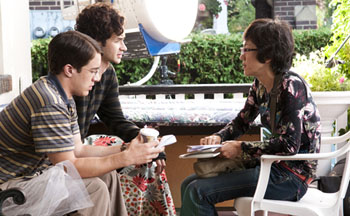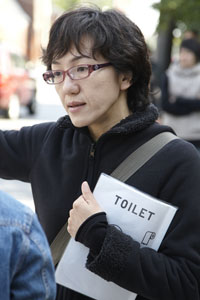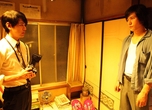Naoko Ogigami talks ‘Toilet’
The challenge of bringing Japanese humour and timing to the world

(c)2010 ‘Toilet’ Film Partners
Posted: Tue Sep 14 2010
Three years since her last film, ‘Kamome Shokudo’ (‘Kamome Diner’) and ‘Megane’ (‘Glasses’) director Naoko Ogigami’s latest film ‘Toilet’ was released on August 28. The story is set in eastern North America and unfolds almost entirely in English. Apart from Masako Motai, who plays the leading role, none of the cast is Japanese. With a great deal of humour, the film paints a picture of a family who cross the boundaries of country and language as their lives are brought closer together.
Time Out Tokyo spoke to Ogigami about the film and what happened during its production.

‘Kamome Shokudo’ was shot in Finland, so this was the second time for you to make a film overseas. How did you find filming in Canada?
NO: It wasn’t so different from filming in Japan. When you are making a movie, everyone generally knows what they have to do and when the have to do it, so even if things aren’t put into words, we understand each other. My cinematographer was Canadian, but everything sort of followed a logical pattern, like we knew once we’ve shot this scene, then naturally we’ll put the camera in this position here for the next one, and so on. It’s pretty much like that wherever you film. Except the one big difference was that in Canada working hours are limited to twelve hours a day. So at the end of the day it felt like we had to rush to get the work done, but it was good to have a clear distinction between on and off time, and not have to think that we might have to keep on shooting and shooting indefinitely like in Japan. I decided to make the film in Canada because I was looking for a good place on the east coast and Toronto has a thriving film industry so it’s an easy place to film in.
Watching the film I felt that things like human emotions go beyond the bounds of language, that they are borderless.
NO: It makes me really happy to hear that. The biggest challenge I gave myself when I made the film was to be able to fully realise my own style of interest and humour and timing, even if the language was different or I was filming in another country.
Have you already had a preview screening overseas? What were the film crew’s reactions like?
NO: The screening for the film crew was like a big party; everyone was laughing out loud and really enjoying it. But everyone there was like family, so it’s difficult to say whether the reactions of the actual audience at the cinemas will be the same…
A lot of American films grab the attention of the audience with speed and they use editing to produce a sense of speed, so I’m interested to see how a work like ‘Toilet’ is received and how people react to it. When my last film ‘Megane’, and the film before it, ‘Kamome Shokudo’, were being shown at film festivals, the audiences laughed in the same kinds of places Japanese people would, so I’m really looking forward to seeing how audiences react this time around.
‘Toilet’ is the fifth time you have made a film with Masako Motai. What is it about her as an actress that most appeals to you?
NO: Masako Motai is always very taciturn, like her character in the film. She’s not the type to just talk and talk, but when she does occasionally make a comment, there is always a certain gravity to her words. Sometimes it’s a very dark joke that will make you laugh, or sometimes it’s something very truthful, but it always seems as if she is seeing through into the true nature of things.
Even when we were filming, while I don’t think she ever intentionally took the lead herself, the aura she projects put her in a completely different class when compared to the younger actors. She’s a veteran actor, and her extensive experience in the field was so much greater than the others that if she was on set then the atmosphere just changed, and there was a sharper sense of tension. Before we started I explained to the three actors playing the children that Masako Motai is a very well known actor in Japan and they treated her with a lot of respect.
I think there are many things about Japanese culture that we can be proud of internationally, but why did you choose the toilet in particular as your theme?
NO: Previously I’d seen people from Finland talking about how amazed and impressed they were by Japanese toilets, and I thought it was quite interesting. That’s when I thought I could make a film based around the idea of the toilet.
Why did you decide to make the film in English?
NO: The fact that I studied filmmaking in America was the first reason. But also, I really love American independent films from the 90s like ‘Welcome to the Dollhouse’, ‘Ghost World’ and ‘American Splendor’. But that kind of scene seems to have fallen away a little. Perhaps because of the economic problems, and the fact that the unions have become too strong, there are a lot of films that are called ‘low-budget’ that aren’t really low budget at all. In Japan you can easily make a low-budget film in the tens of millions of yen bracket [less than a million dollars], but in America it’s not like that, it could be 500 million yen [around six million dollars] or even a billion yen [around 12 million dollars]. But I think that kind of film can’t be called ‘low-budget’ anymore. I get the feeling that in the state of things as they are now something is breaking down. I thought it would be good to be there in that moment when things are changing.
These days, things are much more global and the world is becoming borderless, so it’s possible to see films from countries all over the world. As an independent Japanese filmmaker I wanted to participate in the making of a work like those in the 90s, where the director could be more freely original and creative and the rules were less defined. By making ‘Toilet’ I was hoping people would take another look at the merits of American independent cinema.
Starting with ‘Happy Flight’ director Shinobu Yaguchi, the PIA Film Festival, at which you yourself won an award, has seen the emergence of many of the directors who will be responsible for the next generation of Japanese film. Do you get the feeling that they will bring Japanese film more and more to the forefront?
NO: I’m not really feeling that. [Laughs] I’m pretty self-centred. [Laughs] I never think that I want to work with everyone else and do something together, but I’d like to be one in a lively group of directors involved in independent cinemas and independent filmmaking.
If you were going to make a film overseas again, where would you be interested in going?
NO: Africa!
When you are working overseas is there anything you will always take with you?
NO: My own mug. At the moment I’m using a mug that I bought in Finland with a picture from Moomin on it. I’ll also always bring konbucha (tea made from kelp).

(c)2010 ‘Toilet’ Film Partners
‘Toilet’
(c)2010 ‘Toilet’ Film Partners
Now playing at Shinjuku Piccadilly, Ginza Teatre Cinema, Shibuya Cinequinto and other theatres
Distributor: Showgate/Suurkiitos
Director, Writer: Naoko Ogigami
Cast: Alex House, Tatiana Maslany, David Rendall, Sachi Parker, Masako Motai
Tweets
- About Us |
- Work for Time Out |
- Send us info |
- Advertising |
- Mobile edition |
- Terms & Conditions |
- Privacy policy |
- Contact Us
Copyright © 2014 Time Out Tokyo














Add your comment